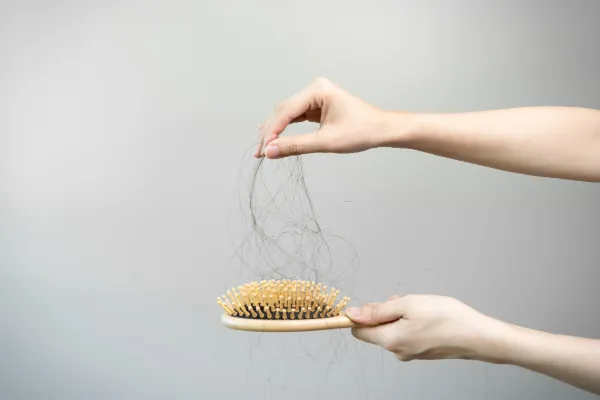この記事の概要
Hair transplantation is one effective solution for men suffering from thinning hair, but not much is known about the connection between hair health and the brain and nervous system. Exploring the relationship between hair and the brain from a neuroscience perspective can help us understand new possibilities and psychological implications of hair transplant treatment. This article details the relationship between hair transplantation and neuroscience and explores the connection between the brain and hair.
The relationship between hair and the brain
Although there is no direct neural connection between hair and the brain, there is a large indirect influence. Hair health is closely related to stress and psychological factors. It is important to understand how stress affects hair health and how hair affects psychological health.
Stress and thinning hair
Stress is one of the main causes of hair loss . Let’s take a look at how stress affects the hair growth cycle.
Stress hormones: When you are stressed, your body releases stress hormones such as cortisol. These hormones disrupt the growth cycle of hair follicles and lengthen the resting phase, causing hair thinning .
Poor circulation: Stress constricts blood vessels and reduces blood flow to the scalp, which deprives hair follicles of nutrients and stunts hair growth.
Hair health and psychological effects
The health of your hair also has a major impact on your psychological wellbeing. How satisfied you are with your appearance is directly linked to your self-esteem and confidence.
Self-confidence and social interaction: Thinning hair or hair loss can cause low self-confidence and social anxiety for many people, which can lead to reduced social interaction and feelings of isolation.
Mental health: Good hair health is associated with improved self-esteem and mental health. Conversely, thinning hair or hair loss can increase the risk of stress and depression.
The relationship between hair transplantation and neuroscience
Hair transplantation is an effective way to solve the problem of thinning hair and improve psychological well-being. From a neuroscience perspective, we explore the psychological impact of hair transplantation.
Psychological effects of hair transplantation
A hair transplant not only improves your appearance, but it also has psychological benefits. Here are some of the effects a hair transplant can have on your psychological health:
Increased self-confidence: A hair transplant increases the volume of your hair and improves your appearance, which in turn improves your self-confidence, which in turn has a positive impact on your social and workplace performance.
Reduced Stress: Being less dissatisfied with your appearance reduces your stress levels, which improves your overall quality of life.
Positive self-esteem: Improving your hair promotes positive self-esteem and improves mental health.
Latest research in neuroscience
Neuroscience research is providing new insights into hair growth and brain health. Here are some of the latest findings.
Nerve Growth Factor (NGF): NGF is a protein that promotes nerve growth and regeneration. Research shows that NGF is also involved in hair follicle growth and may play an important role in treating hair loss .
Blood Flow and Hair Follicles: Neuroscience research has demonstrated the impact of blood flow on hair follicle health. Improving blood flow increases the supply of nutrients to hair follicles, promoting hair growth.
The evolution and future of hair transplant treatment
Advances in neuroscience are helping to develop new methods and techniques for hair transplantation. By utilizing knowledge of neuroscience in hair transplantation treatments of the future, we can expect to see more effective treatments.
Stem Cell Therapy
Stem cells play an important role in nerve regeneration and repair. Using stem cell therapy can help promote hair follicle regeneration and improve the effectiveness of hair loss treatments.
Autologous stem cell transplant : The patient’s own stem cells are harvested, cultured, and then transplanted into the areas of balding , helping to regenerate hair follicles.
Induced pluripotent stem cells (iPS cells): Research is also being conducted on the use of iPS cells to regenerate hair follicles for transplantation . Since iPS cells use the patient’s own cells, the risk of rejection is reduced.
Gene Therapy
Gene therapy is the latest approach to address the underlying causes of hair loss by regulating specific genes to promote hair growth.
Gene editing technology (CRISPR): CRISPR is used to modify genes related to hair loss and promote hair growth, which is expected to provide a fundamental treatment.
Use of gene vectors: Researchers are investigating the use of gene vectors to efficiently deliver therapeutic genes to hair follicles.
summary
Hair transplantation and neuroscience are important fields in understanding the connection between hair and the brain. Many factors are related to hair and the brain, such as the relationship between stress and hair loss , the impact of hair health on psychological health, and the psychological effects of hair transplantation . By utilizing the latest findings in neuroscience, it is hoped that the effectiveness of hair transplant treatments can be improved and more sustainable treatments can be developed.
Hair transplant treatment can help those suffering from thinning hair regain their confidence and improve their psychological well-being. Hopefully, advances in neuroscience will lead to more effective and permanent treatments in the future.








